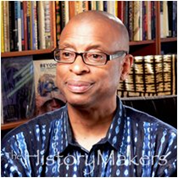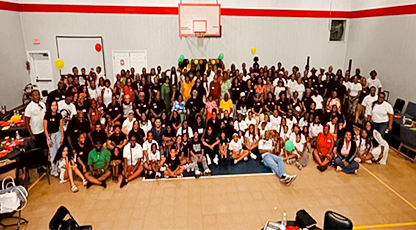Echoes of Our Ancestors: A Lecture Series and Book Experience – Blacks’ Place in American History
Dr. Bernard Moore, a sought-after author and historian of Black ancestry, will present a lecture series that brings to life a powerful collection of historical narratives and personal testimonies celebrating the triumphs and resilience of Black communities throughout history. His extensive global research and groundbreaking insights have established him as a leading consultant in genealogy, particularly for African Americans seeking to uncover and reclaim their heritage.
For many years, Dr. Moore has embraced this mission with scholarly passion, earning him numerous accolades and a respected voice within the academic community. His lectures delve deeply into the nuances of history and personal identity, shedding light on the intricate mosaic of Black ancestry and its profound implications. His unique perspective and extensive research have made his talks not only informative but also deeply moving, resonating with audiences on a personal level. He now brings these captivating stories of heritage and strength to a wider audience, inspiring individuals to explore their own genealogical roots and celebrate their cultural identity. Most recently, Dr. Moore has unearthed his own family’s remarkable legacy, drawing long-overdue attention to their place in American history.



Tal Jones: Black Oil Legacy, co-authored by Dr. Bernard Moore and Dr. Danya Jones Burks, chronicles the life of Dr. Moore’s great-great-grandfather, who began his life in bondage as Chattel Number 5. This powerful work is a heartfelt exploration of the enduring spirit, and tenacity of a Black American family across generations. Through meticulous research and vivid storytelling, Dr. Moore and Dr. Burks illuminate the extraordinary journey of Tal Jones and his descendants, from the harrowing oppression of slavery to the unexpected discovery of wealth and the relentless pursuit of justice.
During his presentation, Dr. Moore will share excerpts from his forthcoming book, Tal Jones: Black Oil Legacy, which has received numerous awards and accolades. The narrative chronicles the remarkable discovery of oil on Tal Jones’s land in Seminole County, Oklahoma. It vividly details the subsequent events, including the unethical dealings of White oilmen who attempted to seize the land and claim its mineral rights. For a review of Dr. Moore’s upcoming book, please read further under “Soon to be Published.”
Special Commentary

United States of Fear
By Irelene P. Ricks, Ph.D.
Watching national news has become a vicious spectator sport where political leaders are modern gladiators representing opposing “teams” of red (GOP) and blue (Dems). We no longer care what people really think – only if they are on the “right” team. Points are assigned for snarky tweets and snippy barbs that have little to do with life or death decisions facing hard-working people who worry about the rising costs of prescription medicine, access to quality education for their children, or affordable housing.
But this is not how it used to be.
Over the last decade, we have witnessed the erosion of civility, basic decency, and common sense that is on constant display in public spaces, social media, and our government. We have observed that democracy is fragile when left unprotected. We watch how bullying threats from an overly zealous executive branch are met with cowardly retreats from policymakers and institutions that should know, and do, better.
We have experienced strife.
The civil rights movement.
Protests against the war in Vietnam.
9-11.
We had hoped that those events would be catalogued with the rest of history, placed on a bookshelf, studied to determine what went wrong and how to prevent those conflicts from ever happening again.
Apparently, we didn’t study hard enough.
Now, children starve to death in Gaza in a bloody war waged by Israel. There are mass deportations of naturalized citizens from the U.S. There are threats to the U.S. Constitution that seem to be sanctioned at the highest political levels, including the Supreme Court. And the world economy is in crisis due to ill-advised tariffs.
What do we do when our government does not reflect the will of its people and promotes fear, oppression, and tyranny?
These questions are not new.
The answer comes from 19th century philosopher Henry David Thoreau, who offers this advice in Civil Disobedience and Other Essays:
“Unjust laws exist, shall we be content to obey them, or shall we endeavor to amend them, and obey them until we have succeeded, or shall we transgress them at once?”
Unfortunately, over one hundred years later, this advice from Thoreau is just as relevant today and offers a kind of political roadmap to a destination away from fear.
If we want to promote democratic values and principles, then we have to demonstrate courage, fortitude, and resilience.
We’ve done it many times before. We must do it again.
Fear is not an option.
The views expressed by the author are her own and are not a reflection of Urban One or any other associations to which she is a member.
Dr. Irelene P. Ricks is currently the director of grants management and development for Urban One Corporate. Her expertise areas are media, social marketing, grant writing and grant management, politics, and civics education. She has a bachelor’s degree in English and Government from Georgetown University and a doctorate in Political Science from Howard University. Her research mentor was the late Dr. Ronald L. Walters.
Dr. Ricks’ daughter, Phoenix Ricks, recently created her own podcast, The Friday Brief by Girl Friday. The podcast is a news podcast for busy listeners who want to stay up-to-date on global affairs and politics. In less than 15 minutes, she shares the day’s top stories and offers ways to get involved.
Family Reunions: A History
(Reprint from Encyclopedia.com)
The idea of gathering together all of one’s family members at a central place and at a given time emerged as a popular American pastime in the 1960s, although family reunions had been held in the United States since the 1880s. Throughout the 1970s, 1980s, and 1990s, however, reunions grew in both popularity and scale as the baby boomer generation aged. To many people, reunions represent an opportunity to return to the “old days” when families resided in the same locale and knew each other very well. While many Americans attend family reunions for purely nostalgic reasons, others are motivated by the urge to get in touch with the family’s “roots.”
During the 1980s, the advent of computers and the Internet began an ongoing interest in amateur genealogy. The many Americans who trace their heritage are often the primary organizers of a family reunion. They wish to share their findings with family members as well as gather new information through personal contact. Furthermore, the Internet has made it easier to advertise reunions as well as to find and correspond with distant relatives.
Some reunions attract a gathering in the hundreds, often held at or near convenient popular resort areas, though smaller reunions remain common. Reunions are usually held in June, July, or August to correspond with family vacations and, since many are often held outdoors at state parks or campgrounds, to coincide with good weather. Making an occasion of mealtimes is an essential ingredient of the American family reunion, typically with each family contributing dishes to the large buffets that are held. The get-togethers might last anywhere between one and three days, with the participants enjoying pastimes that range from games and sports to sightseeing outings, but for many the most enjoyable pastime of all is sitting around talking. Recalling memories of youth, and passing those memories on to the next generation, are important goals of a family reunion. Many adults want their children to get to know their cousins or other extended family members, who influenced their own lives.
Because of their large scale, by the 1990s reunions had come to involve much careful planning and organization. Near the close of a reunion, families often hold a meeting to elect officers to organize the next get-together and perhaps set a date and place where it will be held. A family historian is usually entrusted with the task of recording the events of the reunion, as well as keeping the family history and genealogy up to date. Some families even appoint a fundraising committee to organize events that will pay the costs of getting everybody together and accommodating them. Despite the hard work and responsibilities that go into the arranging of a successful gathering, families enjoy being a part of the communal group that makes up a large reunion.
To commemorate the occasion, organizers often provide a variety of souvenirs for family members to purchase. T-shirts printed with the family name, and the date and place of the reunion are common, while other popular items might include caps, bumper stickers, tote bags, pencils, complete genealogies and family recipe books. Family members also take an abundant number of photographs and home videos to preserve the memory of the gathering.
By the 1990s it was estimated that over 200,000 American families attend a family reunion every year. In an age of smaller nuclear families and changing definitions of a family in general, reunions offer an opportunity for many people to feel a sense of belonging in a larger, extended family unit. Many families are forced to live far distant from their relatives because of work or other circumstances, and reunions give them an opportunity to keep in touch. Whatever a family’s interests, or those of the individuals within it,
reunions offer something for everyone to enjoy within the enhanced sense of close community that they create.
—Angela O’Neal
SCOTTON FAMILY REUNION 2025
The Scotton Family Reunion was held this year from July 25-27, 2025, in High Point, NC. Siler City, NC, was the location of the first reunion; others have occurred alternately in High Point, Salisbury, and Siler City, NC, the original birthplaces and the current residences of many of their children, grandchildren, and great-grandchildren. According to a family journal published by Faye Chandler Scotton in 1994, the original Scotton siblings are as follows,
Female
1871–Deceased
Female
1873–Deceased
Female
1877–1920
Female
1879–Deceased
Male
1881–1963
Ada Scotton
Female
1883–1944
Female
1886–1931
Female
1886–1944
Male
1888–1963
Female
1891–1969
Male
1893–1983
The siblings of George Manuel Scotton are always featured in an attractive pictorial display during the yearly reunion in July. Approximately 300 family members attended the event this year, held at High Point’s popular City Park. Family members enjoyed swimming, various food selections, singing, dance, and other activities. On Sunday, the family attended Stanton Place Church of God of Prophecy in High Point, the home church of the George Scotton family. A Scotton Family Reunion website, created by the great-granddaughter of George Manuel, and the granddaughter of his son, Harry Franklyn, Frankie Lezlee Bethea, is now available for chronicling future reunions. According to the chief organizers of the reunions, each year, they continue to bring together family members from across the U.S. in a joyous celebration of the rich family heritage and traditions. Please see selected 2025 reunion pictures.

Eugene Ethelbert Miller Releases New Album
Eugene Ethelbert Miller, renowned poet and former director of the African American Resource Center at Howard University, has released a new album, “If God Invented Baseball?” Miller was nominated for the 2023 GRAMMY-award for spoken word for his album, “Black Men Are Precious.” The 2026 GRAMMYs will take place Sunday, Feb. 1, 2026, at Crypto.com Arena in Los Angeles. Nominations for the 2026 GRAMMYs will be announced Friday, Nov. 7, 2025.
Academic administrator, author, and poet Eugene Ethelbert Miller was born on November 20, 1950, the youngest of three children, to Egberto Miller, an immigrant from Panama, and Enid Marshall Miller, a homemaker. Born in New York City in the South Bronx, Miller attended Howard University in the fall of 1968. While at Howard University, he studied with Stephen Henderson, one of the foremost literary critics of the Black Arts Movement. In 1972, he graduated from Howard University with a degree in Afro-American Studies, the first member of his family to graduate from college. Published books include Fathering Words, a memoir, which traces his family background and the roots of his art as an African American writer.

Recently Published Books

WHY DO MEN…?: What do women want to know about men? And what are men willing to confess to women? Amazon.com
by R.I. Richardsun

SOON TO BE PUBLISHED

Tal Jones: The Legacy of Black Oil For
More than 100 years: an African American
Family Oil Dynasty
Tal Jones: Black Oil Legacy is a dramatic and emotional story of a former slave turned sharecropper’s discovery of oil on his hardscrabble land. The greed and prosperity he and his family encounter, and a fight all the way up to the Supreme Court was led by his one college-educated daughter. Far more
than that, it is the story of an American family’s struggles and triumphs.
The book by Dr Bernard Moore delves deeply into the roots of the Jones family, tracing their lineage and the pivotal moments that shaped their destiny. It explores the socio-political landscape of the time, shedding light on the systemic injustices that African American families faced. Through meticulous research and compelling narrative, Dr. Moore paints a vivid picture of the determination and strength of the Jones family’s journey.
As readers progress through the pages, they witness the unwavering spirit of Tal Jones and his descendants. The narrative is interwoven with personal anecdotes, historical documents, and reflective commentary, creating a rich tapestry that honors the legacy of the Jones family. Dr. Moore’s scholarship preserves their history and serves as a reminder of the broader African American experience and the ongoing fight for equality and recognition.
Sold into slavery at the age of seven and emancipated by fifteen, Tal Jones embarked on a determined journey to build a future for his family. Leaving Texas, he relocated to Central Oklahoma, where he and his wife, Carrie, along with their extended family, struggled to eke out a living as sharecroppers. Despite enduring relentless poverty and racism, they labored tirelessly on the seemingly barren land they cultivated—land that could barely sustain them. Yet, with unwavering determination, they made the bold decision to purchase the very soil they toiled upon, unaware that it held the hidden promise of untapped wealth.
Then comes the discovery of oil. Huge gushers, a bonanza of black gold in Central Oklahoma. And some of the biggest gushers are found on the hardscrabble land of Tal and Carrie Jones.
The next hundred years are a family saga of fighting for the just property rights in the face of corporate and personal greed. Tal Jones, who never learned to read or write, sues the oil company leasing his land for hiding royalties, for drilling on land it has no rights to. In the process, he discovers his own lawyers have connived with an oil company’s lawyer to steal his land ‘legally’. But the post-Emancipation reaction, with its Jim Crow laws and its fear of a newly emancipated Black population, keeps the law from being on the side of justice. It rules against him. He files an appeal, but, worn out, dies before he can see the result.

His daughter, Exzetta Jones Gorman, with the help of her brother Sam Jones, takes up the fight. She is the first member of the Jones family to earn advanced college degrees, and she is both a powerful woman and a determined one. She takes the case all the way to the Supreme Court. Where the court rules against them. Unfortunately, and not surprisingly, costs are awarded to the very lawyers who perpetrated the original fraud.
In the generations to come, the women of the Jones family carefully keep watch over what royalties are left to pass down. Even these are considerable, for the land is rich in oil and minerals, but the family keeps quiet about them. Greed erupts between siblings. Family steals from family. But not as much as corporations continue to steal from rights holders. A new lawsuit is filed against the oil company that has cheated its royalty holders, and once again, the case goes all the way to the Supreme Court. But this time with a different outcome.
When Bernard Moore delves into the genealogy of his family, he discovers facts about his ancestors, and about the present-day family inheritance of oil riches that boggle his mind. He and his first cousin, Danya Burks, join forces to piece together a complex story of struggle, theft, unexpected kindness, and family love. Seeking to understand the true legacy of their great-great-grandfather, they discover both his legacy of Black oil, and the inheritance of a family history richer and more complicated than either of them could ever have imagined.
This is not the first time a deep dive into genealogy reveals secrets about an American family. Every American family has roots in the past that would surprise, even shock, its descendants. Bernard Moore and Danya Jones Burks, in their own quest, are no exception to discovering drama and inheritance beyond their wildest dreams. And none of it what was expected from researching the history of a family descended from a seven-year-old boy sold away from his family as a slave. A boy who grows up to pull his family back together, to prosper, and to fight for his rights. With a surprise at every twist and turn of the tale.
This is a unique story of a Black American family. This is the story of their most precious inheritance—unexpected, dramatic, and deeply significant—uncovered by their descendants,








